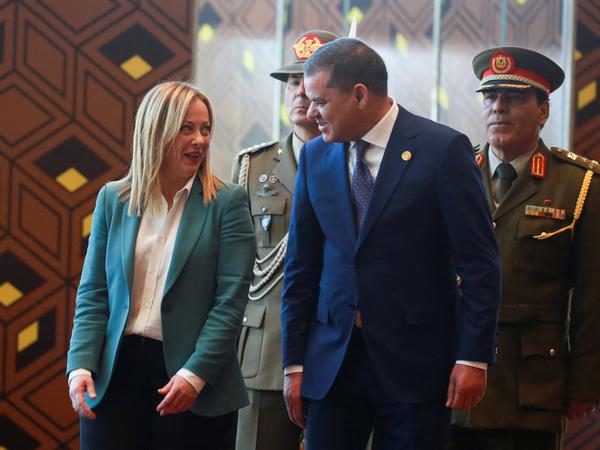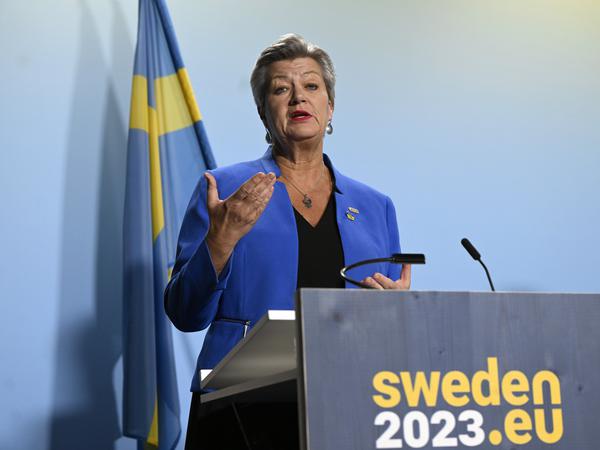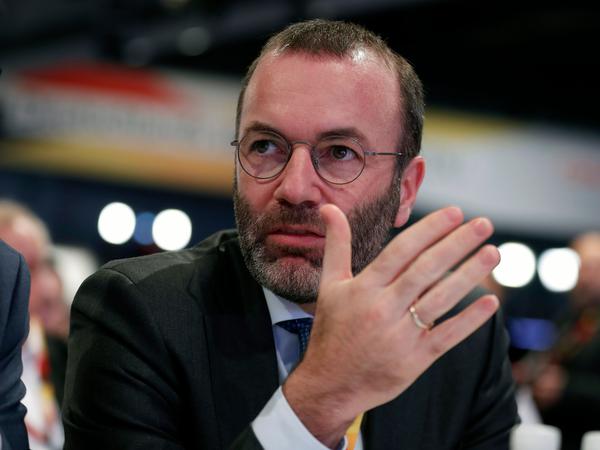Migration policy is one of the really big construction sites in the European Union. Since the so-called refugee crisis of 2015, the community has not been able to agree on a functioning asylum pact, despite several attempts.
Now the topic is boiling up again, which is not only related to the fact that the number of migrants heading to Europe has recently increased again. For this reason, the 27 EU states are meeting again this week in Brussels for a special summit to look for solutions.
One of the main routes for migrants is still the dangerous route across the Mediterranean Sea. At least eight people have died in recent days. The Italian Coast Guard discovered the bodies on board a boat, said Lampedusa Mayor Filippo Mannino.
924,000
asylum applications were made in the EU last year – an increase of almost 50 percent.
He complained that dead migrants were recovered almost every week. For years, Italy has been a prime destination for refugees trying to come to the European Union from Africa. About 105,000 migrants arrived in Italy last year.

It is therefore eagerly awaited how Italy will position itself at the migration summit in Brussels, because Giorgia Meloni has become the face of tougher politics towards the arriving refugees.
Most recently, the ultra-right politician herself traveled to Libya to talk to Prime Minister Abdul Hamid Dbaiba about closer cooperation between the two countries. It was agreed that Italy and Libya would take even more consistent action against boat migrants in the future.
EU repatriation rates remain below target
Apparently, Brussels sees no problem with this pact. EU Council President Charles Michel explained that agreements with North African countries are important for the protection of the EU’s external borders.
The current Swedish Council Presidency has also placed migration at the top of its list of priorities. This is probably due to the fact that the government in Stockholm depends on the support of the right-wing populist Sweden Democrats. At the first meeting of EU interior ministers under Swedish direction, the topic was the faster deportation of migrants who are obliged to leave the country.

“We have a very low return rate and I see that we can make significant progress here,” said EU Interior Commissioner Ylva Johansson in Stockholm. What is disputed, however, is how much pressure the EU should exert on countries of origin with which cooperation is difficult and on the other hand how much incentives for cooperation should be created.
Let’s be honest and frank, fences work.
Miltiadis VarvitsiotisGreek Deputy Foreign Minister
The EU has been trying for years to deport more foreigners without a right to stay, but is making little progress. In 2019, the proportion of people who were obliged to leave the EU and who actually left the EU was 29 percent. In 2021 it was – probably also due to corona – only 21 percent. The EU Commission had announced a target of around 70 percent in 2018.
From the point of view of many EU countries, more returns would also be important because the asylum systems in many countries are completely overburdened. The number of asylum applications rose last year by almost 50 percent to 924,000. Many people have no right to international protection and are overburdening reception capacities, Johansson said.
We don’t need more isolation and certainly no EU-financed walls.
Cornelia Ernestrefugee policy spokeswoman for Die Linke in the European Parliament
The conservatives in the European Parliament have also discovered the topic of migration for themselves. The chairman of the European People’s Party (EPP), Manfred Weber, calls for a change of course in refugee policy.
EU conservatives call for tougher measures
Before the special summit, the deputy CSU chairman proposed a three-point plan that envisages fences at the external borders, asylum applications outside the EU and a new edition of European sea rescue.
Fences are always “the last resort,” Weber explained, “but we need them wherever gangs of people smugglers successfully try to circumvent European law.” Weber also called for “substantial changes to the asylum procedures” that are not mandatory in the European Union would have to take place.

He suggested opening EU offices in Tunisia or Egypt, for example, where people from Africa can apply for asylum in Europe. As a third point, the CSU politician named sea rescue, which is also “a sovereign task of the state” in the Mediterranean and should not be left to civil aid organizations.
Birgit Sippel, SPD MEP, is outraged by these proposals. In migration policy, “the well-known ideas were suddenly pulled out of the mothball box,” she says. What Europe needs is humane and effective migration management.
Cornelia Ernst, spokeswoman on refugee policy for Die Linke in the European Parliament, also opposes the ideas of her CSU colleague Manfred Weber.
We have a very low repatriation rate and I see that we can make significant progress here.
Ylva JohanssonSwedish EU Interior Commissioner
Europe is not in a “migration crisis, but in a crisis of solidarity between member states,” she stresses. Her conclusion: “We no longer need isolation and certainly no EU-financed walls.”
The federal government also rejects the construction of border fences. “We don’t think much of the proposals,” said Secretary of State for Europe Anna Lührmann (Greens) at a meeting in Brussels on Monday. In contrast, Greek Deputy Foreign Minister Miltiadis Varvitsiotis said: “Let’s be honest and frank, fences work.”
They should be funded by the EU Commission “because they prevent people from illegally crossing European borders.” The call for the construction of fences and walls to protect the EU’s external borders is getting louder. For this reason, the topic should also play a central role at the special EU summit this week in Brussels.
To home page

